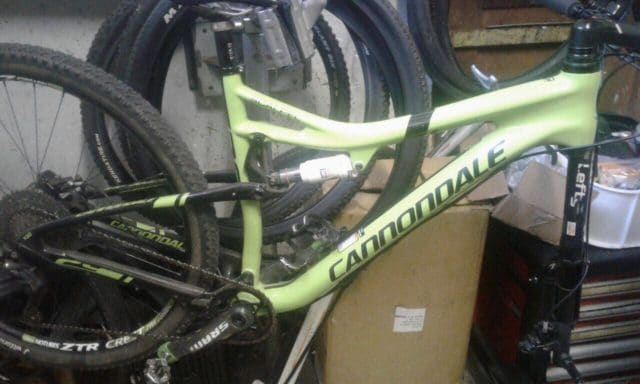Stolen Bike Brought In For Service? What Bike Shops Should Do… But Often Can’t.
Brazen Thief Takes Your Bike For A Service. What The Hell Should The Bike Shop Do? – by Jonathan Ancer

On 1 June three “dodgy” men came into Bridge Cycles in Cape Town’s Diep River with a R75k lime-green Canondale Scalpel and a blue and black Silverback – the bikes had punctures and the men wanted them repaired. The trio didn’t resemble typical racing snakes – the type of people who would own a a Scalpel. Bridge Cycles owner Fazal Osman described the men as “real rough gangsters”.
A customer in the shop took a photo of the bikes and circulated them via What’sApp – and pics soon spread on the cyclists’ grapevine.
One rider saw the photo of the Canondale and recognised it. It was his bike – it had a unique white rear shock. He asked someone to call the cycle shop to tell them to hold onto his bike while he raced there to reclaim it. But by the time he got there it was too late. The punctures had been fixed and the bikes returned to the men.
From a cyclist’s perspective, it feels like we’re under siege for the simple reason we are under siege. So you can’t blame riders for being gatvol and angry.
Soon social media was buzzing with people venting their rage at Bridge Cycles and Osman for giving the bikes back and for not doing more.
In an interview with Bicycling, Osman conceded that he was suspicious, but said he had no right to make that call to withhold the bikes.
“It is very difficult for us because we don’t really know if the bikes are stolen,” he said.
Perhaps he was remembering the social media storm that erupted two years back when Nils Hansen from Woodstock Cycleworks was accused of racially profiling a black customer when he insinuated that the bike he’d brought in for a service was stolen. Hansen initially claimed the incident was taken out of context, but later issued an apology.
It’s an ethical minefield.
The Cops Respond
Osman said he gave back the bikes before he was contacted and asked not to hand over the bikes. While I sympathise with Osman’s damned-if-you-do-damned-if-you-don’t dilemma, I appreciate the anger of the bike owner. But what should Osman have done?
According to police spokesperson Major General Sally de Beer, he should have delayed the process with an excuse and then phoned the SAPS.
“The bike shop owner in the example cited has no powers to detain or preserve the ‘evidence’ (the bike) in these circumstances,” she said.
(Whether the police would have arrived is another story.)
Osman may not have had a legal duty to act but If he believed the bicycles were stolen – and it seems he did – he had an ethical duty to act.
Another reality of the scenario is that Osman admitted he was worried that if he had acted the gangsters might have returned to trash his store.
Bike shops need to be part of the solution. Perhaps they should collude – not in a price-fixing way, of course, but in a stamp-out-crime way – to establish a national ‘stolen bike’ database where bike theft victims can upload the serial number, photos and details of their stolen bikes. Maybe insurance companies could help fund the database – after all, they’re the ones who have to absorb the cost of bike thefts.
All bikes brought in by anyone could be checked against the database and, if a bike is flagged, then the bike shop owner calls the police.
This might not stamp out bike theft but will make it difficult for bike shops to shrug off taking responsibility. Maybe Bridge Cycles can lead this initiative?
How To Get Your Your Own Back
Riders should also be proactive. The first thing you can do to get your bike back is to not get it stolen in the first place. Ride in groups and when you stop for a coffee don’t let your bike out of your sight. If you have to, make sure it’s locked with the a quality lock.
Record your bike’s serial numbers, keep photos of it, give it unique features, and insure it. If your bike does get stolen trawl websites like Gumtree and go to stores like Cash Converters and bike shops to circulate a photo and details of your bike. Report it to the police, get the name and number of the investigating officer – and phone him/her often to find out if there’s any progress in the investigation. Who knows – you might shame them into doing their job.
The Scourge of Bike Thefts
Bikes are ripped out of garages by crowbar-packing thieves, off bike racks by opportunists and riders are bike-jacked in broad daylight. Nowhere is safe – not cycling paths in peak hour nor world wonders like Table Mountain, on whose slopes many cyclists have been parted with their treasured bikes. Bikes are not even safe during a race – just ask Bonita Meiring, whose bike was stolen while she was taking part in Die Burger two years ago.
There are three main reasons why bikes are soft targets:
- Riders are vulnerable, often riding alone or in pairs and easily ambushed;
- There is a market for stolen bikes; and
- Our under-resourced police service seem to view bike theft as a low-priority crime – even though some bikes are worth more than many cars and thieves are often armed and increasingly violent.

